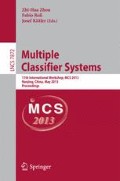Abstract
This paper establishes a link between two supervised learning frameworks, namely multiple-instance learning (MIL) and learning from only positive and unlabelled examples (LOPU). MIL represents an object as a bag of instances. It is studied under the assumption that its instances are drawn from a mixture distribution of the concept and the non-concept. Based on this assumption, the classification of bags can be formulated as a classifier combining problem and the Bayes classifier for instances is shown to be closely related to the classification in LOPU. This relationship provides a possibility to adopt methods from LOPU to MIL or vice versa. In particular, we examine a parameter estimator in LOPU being applied to MIL. Experiments demonstrate the effectiveness of the instance classifier and the parameter estimator.
Access this chapter
Tax calculation will be finalised at checkout
Purchases are for personal use only
Preview
Unable to display preview. Download preview PDF.
References
Dietterich, T., Lathrop, R., Lozano-Pérez, T.: Solving the multiple instance problem with axis-parallel rectangles. Artificial Intelligence 89(1-2), 31–71 (1997)
Andrews, S., Tsochantaridis, I., Hofmann, T.: Support vector machines for multiple-instance learning. In: Adv. Neu. Inf. Proc. Sys., pp. 577–584 (2003)
Chen, Y., Bi, J., Wang, J.: MILES: Multiple-instance learning via embedded instance selection. IEEE Trans. PAMI 28(12), 1931–1947 (2006)
Zhou, Z., Sun, Y., Li, Y.: Multi-instance learning by treating instances as non-IID samples. In: Proc. 26th ICML, pp. 1249–1256 (2009)
Babenko, B., Yang, M., Belongie, S.: Visual tracking with online multiple instance learning. In: IEEE CVPR, pp. 983–990 (2009)
Denis, F.: PAC learning from positive statistical queries. In: Richter, M.M., Smith, C.H., Wiehagen, R., Zeugmann, T. (eds.) ALT 1998. LNCS (LNAI), vol. 1501, pp. 112–126. Springer, Heidelberg (1998)
Lee, W., Liu, B.: Learning with positive and unlabeled examples using weighted logistic regression. In: Proc. 20th ICML, pp. 448–455 (2003)
Liu, B., Dai, Y., Li, X., Lee, W., Yu, P.: Building text classifiers using positive and unlabeled examples. In: Proc. Int’l Conf. Data Mining, pp. 179–188 (2003)
Yu, H., Han, J., Chang, K.: PEBL: Web page classification without negative examples. IEEE Trans. Know. and Data Eng. 16(1), 70–81 (2004)
Zhou, K., Xue, G., Yang, Q., Yu, Y.: Learning with Positive and Unlabeled Examples Using Topic-Sensitive PLSA. IEEE Trans. on Knowledge and Data Engineering 22(1), 46–58 (2010)
Elkan, C., Noto, K.: Learning classifiers from only positive and unlabeled data. In: Proc. 14th ACM Conf. Knowledge Discovery and Data Mining, pp. 213–220 (2008)
Maron, O., Lozano-Pérez, T.: A framework for multiple-instance learning. In: Adv. Neu. Inf. Proc. Sys., pp. 570–576 (1998)
Li, W.J., Yeung, D.Y.: MILD: Multiple-instance learning via disambiguation. IEEE Transactions on Knowledge and Data Engineering 22(1), 76–89 (2010)
Ray, S., Craven, M.: Supervised versus multiple instance learning: An empirical comparison. In: Proc. 22nd Int’l Conf. Mach. Learn., pp. 697–704 (2005)
Foulds, J., Frank, E.: A review of multi-instance learning assumptions. The Knowledge Engineering Review 25(01), 1–25 (2010)
Li, Y., Tax, D., Duin, R., Loog, M.: Multiple-instance learning as a classifier combining problem. Pattern Recognition 46(3), 865–874 (2013)
Blum, A., Kalai, A.: A note on learning from multiple-instance examples. Machine Learning 30(1), 23–29 (1998)
Bishop, C.: Pattern Recognition and Machine Learning. Springer, New York (2006)
Zhou, Z., Xu, J.: On the relation between multi-instance learning and semi-supervised learning. In: Proc. 24th ICML, pp. 1167–1174 (2007)
Gehler, P., Chapelle, O.: Deterministic annealing for multiple-instance learning. In: Proc. 11th Int’l Conf. AISTAT, pp. 123–130 (2007)
Li, F., Sminchisescu, C.: Convex Multiple-Instance Learning by Estimating Likelihood Ratio. In: Adv. Neu. Inf. Proc. Sys., pp. 1–8 (2010)
Author information
Authors and Affiliations
Editor information
Editors and Affiliations
Rights and permissions
Copyright information
© 2013 Springer-Verlag Berlin Heidelberg
About this paper
Cite this paper
Li, Y., Tax, D.M.J., Duin, R.P.W., Loog, M. (2013). The Link between Multiple-Instance Learning and Learning from Only Positive and Unlabelled Examples. In: Zhou, ZH., Roli, F., Kittler, J. (eds) Multiple Classifier Systems. MCS 2013. Lecture Notes in Computer Science, vol 7872. Springer, Berlin, Heidelberg. https://doi.org/10.1007/978-3-642-38067-9_14
Download citation
DOI: https://doi.org/10.1007/978-3-642-38067-9_14
Publisher Name: Springer, Berlin, Heidelberg
Print ISBN: 978-3-642-38066-2
Online ISBN: 978-3-642-38067-9
eBook Packages: Computer ScienceComputer Science (R0)

